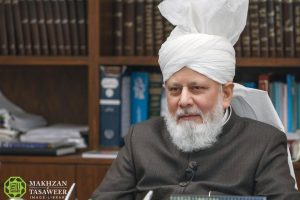
Azhar Goraya, Puerto Rico
There was once a time when a person could live their entire life without questioning their beliefs. The idea was that there really is nothing else ‘out there’ which meant everyone essentially conformed to the same ideas.
In more modern times, the data revolution initiated by the printers, telegraphs, and faxes has culminated in the informational wonderland via the tweets, posts and video shorts of today. As a result, what was once a slow trickle of ideas and information has transformed into a massive torrent, sweeping the unsuspecting and inexperienced into its depths.
So, it’s no surprise then that when it comes to matters of religion, the youth of today are quick to present the findings of their ‘in-depth’ research courtesy of Google, but are slow to confidently choose one for themselves.
We live in a world of endless options, societal pressures, liberalism that increases by the day, and a lack of depth in knowledge, all of which have muddied the waters. For those born into a certain religion, they may question if theirs is the true one. The lack of clarity can be nerve-wracking.
To those seekers of truth who are confused by what the many religions of the world have to offer, I present what I hope can be the necessary filter from the clutter.
That guiding principle is the fulfillment of prophecies.
Through clear and heavenly signs, the Messiah of the age, Mirza Ghulam Ahmad (as), has demonstrated beyond any reasonable doubt that both yesterday and today, it is Islam alone that stands unchallenged at the peak. It’s path to salvation is based not on conjecture, but easily understandable objective truths that satisfy not only the searching heart, but also the steady intellect.
Among the many proofs he presented in support of Islam is the astonishing number and nature of its fulfilled prophecies.
As humans, we are limited in our knowledge of the future, and in many cases powerless to affect its course. We cannot accurately and consistently predict what will happen to us tomorrow. So, if a person was to predict events of the future precisely and regularly, that would be sufficient to establish that there was certainly a greater power working behind him.
This greater power showed it’s hand when hidden and at times seemingly impossible events regarding the future were revealed to the chief of Prophets, Muhammad (sa). The All-Knowing showed clear and unmatched signs of his truthfulness so that the world may free itself of the incessant doubts regarding the true faith.
There are numerous prophecies found in the Holy Qur’an. One such prophecy that is repeatedly emphasized in the Qur’an is the victory of the Holy Prophet (sa) over his enemies. For example, it is stated in the Holy Qur’an:
‘The Unbelievers spend their wealth to hinder (man) from the path of Allah, and so will they continue to spend; but in the end they will have (only) regrets and sighs; at length they will be overcome.’ (The Qur’an 8:37).
This was marvelously demonstrated when after a drawn out conflict spanning two decades, Islam was established from East to West in Arabia. The Holy Qur’an also foretold:
‘Surely, it is thy enemy who is without issue.’ (The Holy Qur’an, 108:4)
True to these words, the children of the fiercest enemies of the Holy Prophet (sa) abandoned their parents and tribal affiliations, presenting their lives before the Holy Prophet Muhammad (sa) as humble members of the global brotherhood of Islam.
Or, there was the prophecy foretelling the victory of the Roman Empire:
‘The Romans have been defeated. In the land nearby, and they, after their defeat, will be victorious. In a few years…’ (The Holy Qur’an, 30:3-5)
Despite their state of weakness in which victory seemed like an unattainable notion when this prophecy was made, the Byzantines not only achieved victory over the Persians, but did so within the timeframe stipulated by the Holy Qur’an.
These examples of fulfilled prophecy are not ancient stories. Those who seek signs of a living God can rejoice in that the Qur’an is the living word of God that satisfies seekers with fresh signs in every age.
When the Qur’an stated that a time would come ‘when books are spread abroad’ (The Holy Qur’an, 81:111), the Gutenberg press had not yet been imagined. When it declared that ‘the skies would be laid bare’ (The Holy Qur’an, 81:12), the wondrous advances in astronomy had not yet been realised.
The signs are many, but so too is the freedom of man to choose his destiny. A horse can be lead to the water, but can’t be made to drink. Prophecies are meant to guide, but not forcefully bend the mind and spirit in obedience to the Creator.
For those who are seeking the truth, such signs are the outer pieces of the puzzle that must be joined with the larger canvas: humility, seeking the forgiveness of God, repentance, prayer and the doing of good deeds. Only when joined together can a person become whole and worthy of himself experiencing God.
Our technological age will continue to provide us with ever greater access to information, but it would be wise to remember that those choices are not always equally acceptable or objectively true. Rather, the proliferation of choices demands that we become more adept at critical thinking and develop the confidence and determination to overcome ‘paralysis by choice’ by hanging on firmly to that which we know to be true – that Islam is a living religion revealed by God, perennial in its blessings, and convincing in its precepts and explanations.
About the Author: Azhar Goraya is a graduate from the Ahmadiyya Institute of Languages and Theology in Canada. He is currently serving as an Imam of the Ahmadiyya Muslim Community in Puerto Rico. He is also the Central American Coordinator for The Review of Religions en Español.



Add Comment